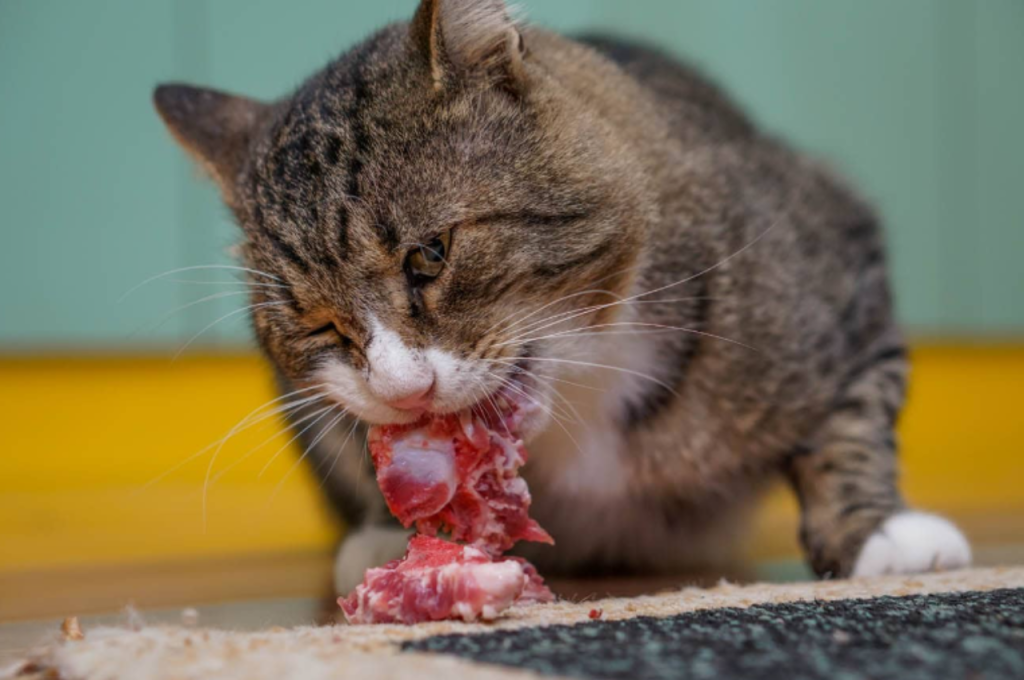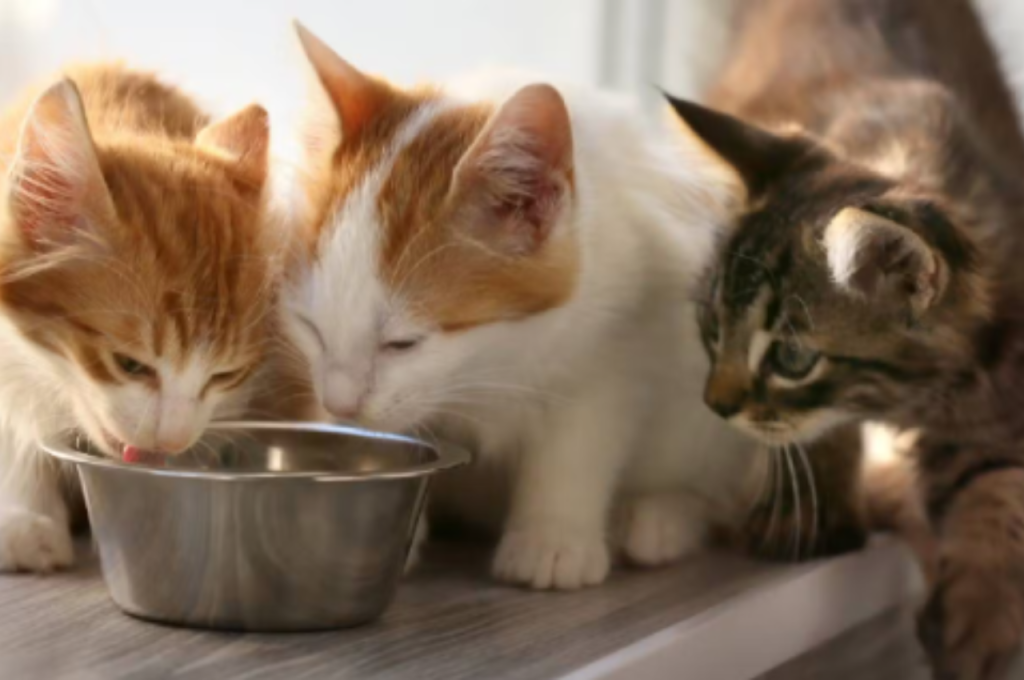Yes, cats can eat raw meat as it is a natural part of their diet. Cats are obligate carnivores, meaning that they require a diet rich in animal protein.
Raw meat provides essential nutrients and enzymes that can benefit their overall health. However, it is important to note that raw meat should be handled and prepared carefully to minimize the risk of bacterial contamination. It is recommended to freeze the meat for at least 3 days to kill any potential parasites.
Consulting a veterinarian before introducing raw meat into a cat’s diet is advisable to ensure proper balance and nutrition. Feeding raw meat can be a healthy option for cats, but it’s crucial to follow guidelines to ensure their well-being.
Cats’ Natural Diet
Cats are natural carnivores, making raw meat a suitable option for their diet. It provides essential nutrients and mirrors their ancestral eating habits, promoting overall health and well-being. However, proper handling and sourcing are crucial to ensure safety and prevent potential health risks for cats.

Carnivorous Nature of Cats
Cats, as obligate carnivores, have unique dietary needs that primarily revolve around meat consumption. This means that their diet must primarily consist of animal-based proteins to meet their nutritional requirements and maintain optimal health.
Nutrient Requirements of Cats
Cats need certain nutrients like protein, taurine, and vitamin A for optimal health. Cats thrive on a diet that mirrors their wild ancestors’ eating habits. They are strict carnivores, needing meat for their overall well-being. Cats are obligate carnivores, meaning they require a diet primarily based on meat.
This need for meat stems from their evolutionary biology, where their bodies have adapted to digesting and utilizing animal-based proteins efficiently. Cats need certain nutrients like protein, taurine, and vitamin A for optimal health.
Providing a diet that aligns with a cat’s natural requirements is crucial for their long-term health and vitality.
Benefits of Raw Meat for Cats
Feeding cats a raw meat diet is a controversial topic among pet owners and veterinarians. While some argue that raw meat can pose health risks, many cat owners believe it offers several benefits. Here are some of the advantages of incorporating raw meat into your cat’s diet:
Improved Digestion
Raw meat is biologically appropriate for cats as it closely resembles their natural prey. Cats are obligate carnivores, meaning their bodies are designed to digest and derive nutrition from animal protein. Feeding them a raw meat diet can lead to improved digestion.
- Higher nutrient absorption: Raw meat contains natural enzymes and essential amino acids that can aid in the breakdown and absorption of nutrients, allowing your cat to effectively utilize the valuable nutrients present in their food.
- Reduced risk of allergies: Some cats may have sensitivities to grains, additives, or preservatives commonly found in commercial cat food. Feeding them raw meat eliminates potential allergens, reducing the risk of digestive issues and skin irritations.
- Decreased likelihood of digestive problems: Raw meat contains essential moisture, which helps prevent dehydration and maintain proper hydration levels in your cat’s digestive system. This can aid in preventing common digestive problems like constipation.
Healthier Coat and Skin
Your cat’s coat and skin reflect their overall health. Incorporating raw meat into their diet can contribute to a shinier coat, and healthier skin, and reduce the risk of common skin issues.
- Increased moisture intake: Raw meat naturally contains higher moisture content compared to dry cat food. Adequate hydration can promote healthier skin and coat, minimizing the risk of dryness, dandruff, and itchiness.
- Optimal omega-3 fatty acids: Raw meat, particularly fish, is rich in omega-3 fatty acids, which are essential for maintaining healthy skin and a glossy coat. These fatty acids help reduce inflammation and can alleviate common skin problems like itching or flaking.
- Minimized exposure to additives: Many commercial cat foods contain artificial preservatives, flavors, and colors. By feeding your cat raw meat, you can eliminate these potential irritants that may contribute to skin allergies or coat problems.
Risks of Feeding Raw Meat to Cats
Feeding raw meat to cats has become a contentious topic among pet owners. While some argue that a raw meat diet mirrors a cat’s natural dietary habits, others caution about the potential risks involved. It’s important to be aware of the potential hazards before deciding to introduce raw meat into your cat’s diet.

Bacterial Contamination
Cats that consume raw meat are at risk of ingesting harmful bacteria such as Salmonella, E. coli, and Listeria. These pathogens can cause severe gastrointestinal infections and pose a threat to the overall well-being of the feline. Additionally, the transmission of these bacteria to humans through handling or accidental ingestion of contaminated meat cannot be overlooked.
Parasites and Diseases
Raw meat can be a source of various parasites and diseases that may compromise a cat’s health. The ingestion of undercooked or contaminated meat can lead to the infestation of parasites such as Toxoplasma gondii, which can result in toxoplasmosis. Furthermore, raw meat diets have been associated with an increased risk of bacterial infections and foodborne illnesses in cats.
Transitioning To A Raw Meat Diet
Cats are obligate carnivores, meaning their bodies are designed to thrive on a diet primarily consisting of meat. Transitioning your cat to a raw meat diet can have numerous benefits, including improved digestion, healthier skin and coat, and increased energy levels. However, the switch must be done carefully to ensure your cat’s nutritional needs are met.
Gradual Introduction
When transitioning your cat to a raw meat diet, it’s essential to introduce the new food gradually. Start by mixing small amounts of raw meat with your cat’s current diet, increasing the proportion of raw meat over several weeks. This gradual transition allows the cat’s digestive system to adapt to the new diet without causing gastrointestinal upset.
Consulting A Veterinarian
Before making any significant changes to your cat’s diet, it’s crucial to consult with a veterinarian. A vet can provide personalized guidance based on your cat’s individual health and nutritional needs, as well as offer insight into the potential risks and benefits of a raw meat diet. They can also recommend appropriate supplements to ensure your cat receives all essential nutrients.
Best Practices for Feeding Raw Meat to Cats
Feeding raw meat to cats is a popular trend among pet owners who prefer a more natural approach to their feline companion’s diet. However, it is crucial to understand the best practices for introducing raw meat into your cat’s meal plan. By following these guidelines, you can ensure the health and well-being of your cat while reaping the benefits of a raw meat diet.
Quality and Variety of Meat
When it comes to feeding your cat raw meat, the quality and variety of the meat are essential factors to consider. Your cat’s diet should consist of quality, human-grade meats that are free from hormones, antibiotics, and preservatives. This ensures that your cat gets the necessary nutrients without any harmful additives.
Furthermore, it is crucial to offer a variety of meats to your cat. Different types of meats provide a diverse range of nutrients that can contribute to your cat’s overall health. This variety mimics the natural diet of cats in the wild and helps prevent nutritional imbalances.
Here are some examples of quality meats you can feed your cat:
| 1. | Chicken (bone-in, skinless) |
| 2. | Turkey (bone-in, skinless) |
| 3. | Beef (lean cuts) |
| 4. | Lamb (lean cuts) |
| 5. | Rabbit (bone-in) |
Supplementation and Monitoring
While feeding raw meat to your cat provides many benefits, it is crucial to supplement their diet and monitor their health to maintain optimal well-being.
One important supplement to include is taurine, an essential amino acid for cats. Taurine is naturally found in animal tissues, but it can degrade during the freezing or cooking process. Therefore, supplementation is necessary to prevent taurine deficiency, which can lead to severe health issues.
In addition to taurine, it is essential to monitor your cat’s weight, muscle condition, and overall health regularly. Observe any changes in their behavior, appetite, or stool quality. If you notice any concerning symptoms, it is advisable to consult a veterinarian to ensure your cat’s well-being.
By adhering to these best practices, you can safely provide your cat with the benefits of a raw meat diet. Remember to prioritize quality and variety of meat, supplement appropriately, and monitor their health closely. Your furry friend will thank you for your vibrant energy and overall vitality!
Alternative Options
When it comes to feeding your cat raw meat, there are several alternative options you can consider to ensure they are getting a well-balanced diet. Let’s explore some of these options below:

Commercial Raw Food Diet
A commercial raw food diet includes pre-packaged raw meat formulated specifically for cats. These diets are balanced with essential nutrients and are convenient for pet owners.
Cooked Meat Diet
Another alternative is feeding your cat cooked meat. Cooked meat can be a safer option as it eliminates the risk of bacteria commonly found in raw meat while still providing necessary protein for your cat.
Frequently Asked Questions
Certainly! Here are some frequently asked questions (FAQs) about feeding raw meat to cats:
Can cats safely eat raw meat?
Yes, cats can consume raw meat safely as it mimics their natural diet. However, it’s important to ensure the meat is fresh and free from harmful bacteria to prevent any potential health issues for your pet.
Is raw meat a complete diet for cats?
While raw meat can be a part of a cat’s diet, it’s not considered a complete and balanced meal on its own. It’s essential to provide a variety of nutrients including vitamins, minerals, and other essential components to ensure your cat’s overall health and well-being.
What are the potential risks of feeding cats raw meat?
Feeding raw meat to cats can pose risks such as bacterial contamination, parasitic infections, and nutritional imbalances. It’s crucial to handle and store raw meat properly and consult with a veterinarian to understand the potential risks and best practices for feeding your cat raw meat.
What precautions should be taken when feeding cats raw meat?
When feeding cats raw meat, it’s important to ensure the meat is fresh, properly handled, and sourced from a reputable supplier. Additionally, practicing good food safety measures, consulting with a veterinarian, and monitoring your cat’s health are essential precautions to take when incorporating raw meat into their diet.
Conclusion
To sum it up, cats are natural carnivores and are biologically designed to consume raw meat. While raw meat can provide essential nutrients and hydration, it is important to follow the necessary safety precautions to prevent bacterial infections. Ensure that the raw meat is of high quality, properly prepared, and balanced with other dietary needs.
Consulting with a veterinarian is key to determining the best diet for your feline companion. Make informed decisions that prioritize your cat’s health and well-being.
